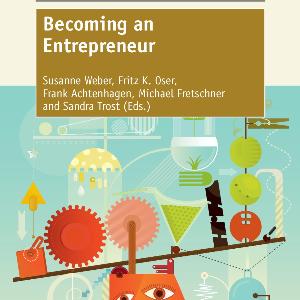Project: "START with Business Modelling
"START with Business Modelling" is a cooperation project between the Institute for Innovation Management (IIM), the Institute for Human Resource Education & Management (IWP) and the IEC of LMU. The aim of the project, which is offered regularly as part of a compulsory course for all Bachelor's students in the faculty, is to design value creation and capture through business models. The students systematically acquire theoretical knowledge in lectures, discuss its relevance and implementation possibilities with guest speakers and, in parallel, develop a business model for a real start-up in small teams. In the process, they are guided, supported and supervised by mentors trained in advance from several institutes of the Munich School of Management and student tutors. In terms of content, the start-up project is related to and analysed in terms of all aspects of the CANVAS business model, e.g. value proposition, customer segments or revenue streams.
For further information:
https://www.iec.uni-muenchen.de/take-off/start-with-business-modelling2/index.html

Becoming an Entrepreneur
Weber, S., Oser, F., K., Achtenhagen, F., Fretschner, M., & Trost, S. (Eds.) (2014). Becoming an Entrepreneur. Rotterdam, Boston, Taipei: Sense.
The world of work, but also our other areas of life, are influenced to a great extent by economic, technological and social changes. In this context, the central task is to develop and promote entrepreneurial thinking and action within the framework of commercial education and training - both in the sense of entrepreneurship education as support for founding one's own company and from the perspective of intrapreneurship education as entrepreneurial thinking and action within a company.
An entrepreneur is characterised by the fact that he/she is able to recognise market opportunities, pick them up, evaluate them and implement them with a profit-oriented intention (monetary, but also non-monetary (such as job satisfaction)) by developing a new business idea. This includes above all initiative, an innovative bundling and coordination of resources, but also the willingness to take calculated financial, psychological and social risks and uncertainty in implementing the business idea by founding an organisation. An intrapreneur acts like an entrepreneur. He/she implements a new business idea within an existing organisation.
In addition to illuminating various aspects of entrepreneurship/intrapreneurship education, the aim is to describe and analyse the processes of teaching and acquiring this competence. From a curricular perspective, the main aim is to specify the facets of entrepreneurship/intrapreneurship competence as well as typical situational challenges in order to be able to implement targeted instructional measures, but also to review the intended learning goals and evaluate the measures taken from an assessment perspective.
Selected publications:
- Ritter von Marx, S. (2018). Challenges of sustainable entrepreneurs – A systematic literature review. In S. Ritter von Marx (Ed.), Identifying Domain-Specific Challenges for Entrepreneurship Eduction Programms – Empirical Analyses (pp. 157-234). München: Dr. Hut.
- Prinzing, K., Ritter von Marx, S., & Guggemos, J. (2017). Team psychological safety and team conflict in collegiate business planning teams. In K. Prinzing (Ed.), Selected essays on team competency and on team work (pp. 213-257). München: Dr. Hut
- Benninghoff, H., & Weber, S. (2014). Identification of Entrepreneurial Challenges as Essential Condition for Modeling Entrepreneurial Competence. In S. Weber, F. Oser, F. Achtenhagen, M. Fretschner & S. Trost (Eds). Becoming an entrepreneur (pp. 35-54). Sense: Rotterdam, Boston, Taipei.
- Hofmuth, M. (2014). Identifying Knowledge, Skills and Abilities of Successful Entrepreneurs. In S. Weber, F. Oser, F. Achtenhagen, M. Fretschner & S. Trost (Eds). Becoming an entrepreneur (pp. 55-75). Sense: Rotterdam, Boston, Taipei.
- Fretschner, M. & Weber, S. (2013). Measuring and Understanding the Effects of Entrepreneurial Awareness Education. Journal of Small Business Management, 51(3), 410-428.
- Weber, S., & Funke, S. (2012). An „instructional“ perspective on entrepreneurship education - focussing on the development of team competencies. Empirical Research in Vocational Education and Training, 4(1), 49-72.
- Weber, S., & Starke, S. (2010). Lernpotential und Effekte eines Business Planning-Kurses. Unterrichtswissenschaft, 38(4), 295-321.
Contact:
Prof. Dr. Susanne Weber
Institute for Human Resource Education & Management
Munich School of Management
Ludwig-Maximilians University Munich
